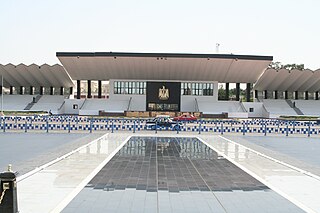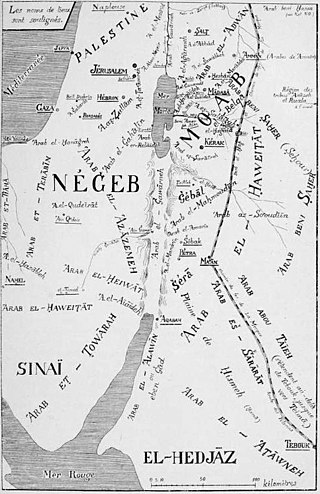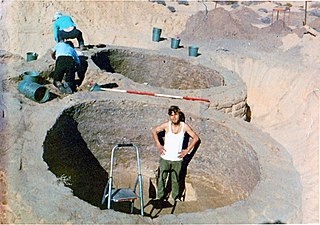Related Research Articles

The Senusiyya, Senussi or Sanusi are a Muslim political-religious Sufi order and clan in colonial Libya and the Sudan region founded in Mecca in 1837 by the Grand Sanussi, the Algerian Muhammad ibn Ali al-Sanusi. Sanusi was concerned with what he saw as both the decline of Islamic thought and spirituality and the weakening of Muslim political integrity.

North Sinai Governorate is one of the governorates of Egypt. It is located in the north-eastern part of the country, and encompasses the northern half of the Sinai Peninsula. It is bordered in the north by the Mediterranean Sea, in the south by South Sinai Governorate, in the west by Port Said, Ismailia, and Suez Governorates, and in the east by the Gaza Strip in Palestine and Israel. Its capital is the city of El Arish. A governorate is administered by a governor, who is appointed by the President of Egypt and serves at the president's discretion.
Banū Tamīm is an Arab tribe that originated in Najd in the Arabian Peninsula. It is mainly present in Saudi Arabia, Qatar, Kuwait, Iraq, Jordan, a strong presence in Algeria, and Morocco, Palestine, Tunisia, and Libya. It is also present in many other parts of the Arab world such as Egypt and Khuzestan in Iran. The word Tamim in Arabic means strong and solid. It can also mean those who strive for perfection.

Abu al-Hasan al-Shadhili also known as Sheikh al-Shadhili was an influential Moroccan Islamic scholar and Sufi, founder of the Shadhili Sufi order.

Terrorism in Egypt in the 20th and 21st centuries has targeted the Egyptian government officials, Egyptian police and Egyptian army members, tourists, Sufi Mosques and the Christian minority. Many attacks have been linked to Islamic extremism, and terrorism increased in the 1990s when the Islamist movement al-Gama'a al-Islamiyya targeted high-level political leaders and killed hundreds – including civilians – in its pursuit of implementing traditional Sharia law in Egypt.

Ahmed Mohamed Ahmed El-Tayeb is an Egyptian Islamic scholar and the current Grand Imam of al-Azhar, Al-Azhar Al Sharif and former president of al-Azhar University. He was appointed by the Egyptian President, Hosni Mubarak, following the death of Mohamed Sayed Tantawy in 2010. He is from Kurna, Luxor Governorate in Upper Egypt, and he belongs to a Sunni Muslim family.

The Tarabin Bedouin, also known as Al-Tirabin, were the most important Bedouin tribe in the Sinai Peninsula during the 19th century, and the largest inside Negev. Today this tribe resides in the Sinai Peninsula but also in Cairo, Ismailia, Giza, Al Sharqia and Suez, Israel (Negev), Jordan, Saudi Arabia and the Gaza strip. A township named Tirabin al-Sana was built in Israel in 2004 especially for the members of al-Sana clan from Al-Tirabin tribe.
Sheikh Zuweid is a Bedouin town in the North Sinai Governorate of Egypt near the border with the Gaza Strip. It is situated between the cities of Arish and Rafah and is 334 kilometers northeast of Cairo. It has a population of around 60,000 as of 2015.

The Sinai insurgency was an insurgency in the Sinai Peninsula, Egypt, that was commenced by Islamist militants against Egyptian security forces, which have also included attacks on civilians. The insurgency began during the Egyptian Crisis, during which the longtime Egyptian president Hosni Mubarak was overthrown in the 2011 Egyptian revolution.

Since the classical era, traditional Islamic religious culture was divided between two main theological schools, Sufi-Ash'arism represented by Ghazzali (1058-1111) and Salafism represented by Ibn Taymiyya (1263-1328). The dispute between these two schools of thought dominated the Sunni world, splitting their influence across religious communities and cultures, with each school competing for scholarly authority via official and unofficial religious institutions. The relationship between Salafism and Sufism – two movements of Islam with different interpretations of Islam – is historically diverse and reflects some of the changes and conflicts in the Muslim world today.

The Islamic State – Sinai Province is a branch of the militant Islamist group Islamic State that is active in the Sinai Peninsula of Egypt.

In July 2013, at the same time as mass protests began against the 3 July coup d'état which deposed Mohamed Morsi, and in parallel with the escalation of the already ongoing jihadist insurgency in the Sinai Peninsula, pro-Muslim Brotherhood militants started violent attacks against policemen and soldiers in Central and Western Egypt. In the following months, new Islamist armed groups were created to reinstate Islamist rule in Egypt, like Soldiers of Egypt and the Popular Resistance Movement. Since 2013, violence in mainland Egypt has escalated and developed into a low-level Islamist insurgency against the Egyptian government.

Al-Qaeda in the Sinai Peninsula, or AQSP, was an Egyptian militant jihadist organization possibly formed by a merger between al-Qaeda operatives in Sinai and Ansar al Jihad. It was Al-Qaeda's branch in the Sinai peninsula, and is composed of many Al-Qaeda factions in the area. AQSP made international headlines in November 2014 when the organization pledged allegiance to the Islamic State (IS) in a nine-minute audio speech released on Twitter.

Persecution of Sufis over the course of centuries has included acts of religious discrimination, persecution, and violence both by Sunni and Shia Muslims, such as destruction of Sufi shrines, tombs and mosques, suppression of Sufi orders, murder, and terrorism against adherents of Sufism in a number of Muslim-majority countries. The Republic of Turkey banned all Sufi orders and abolished their institutions in 1925, after Sufis opposed the new secular order. The Islamic Republic of Iran has harassed Sufis, reportedly for their lack of support for the government doctrine of "governance of the jurist".
At 1:50 PM EET on 24 November 2017, the al-Rawda mosque was attacked by roughly 40 gunmen during Friday prayers. The mosque is located in the village of Al-Rawda east of the town of Bir al-Abed in Egypt's North Sinai Governorate. It is one of the main mosques associated with the Jaririya Sufi order, one of the largest Sufi orders in North Sinai. The Jaririya order is named for its founder, Sheikh Eid Abu Jarir, who was a member of the Sawarka tribe and the Jarira clan. The Jarira clan resides in the vicinity of Bir al-Abed. The attack killed 311 people and injured at least 128, making it the deadliest attack in Egyptian history. It was the second-deadliest terrorist attack of 2017, after the Mogadishu bombings on 14 October. The attack was universally condemned by many world leaders and organizations.

Bir al-Abed is one of the cities of North Sinai in the north east of Egypt. It is the capital of Bir al-Abd Markaz, located on the international coastal road on the shores of Lake Bardawil.
The Sinai Mujahideen were a militant group during the War of Attrition between Egypt and Israel. It was initially organized when Egyptian military intelligence reached out to Eid Abu Jarir, who was asked to recruit seven fellow tribal members, and helped start three branches based in Port Said, Ismailia and Suez. Besides Jarir, it drew strength from other Bedouin Sufi Darqawa figures such as Khalaf al-Khalafat, as well as its most important military leader, Hassan Khalaf. In 1997, A veterans group under this name is currently organized under the Egyptian NGO Law, which has also been active in opposing Ansar Bait al-Maqdis.

Eid Abu Jarir was a Sufi shaykh who founded the eponymous Jaririya Sufi order in Sinai, Egypt. Alongside his teacher Abu Ahmed al-Ghazawi, who founded the Alawi-Ahmadi tariqah, he is considered one of the founders of Sufism in the Sinai Peninsula. He was a member of the Jarir clan of the al-Sawarka tribe. The main three Sufi lodges he established, starting in the winter of 1953-1954, are the Sa’ud lodge in Sharqia, the Arab lodge in Ismailia, and the Rawdah lodge in North Sinai, the last of which was attacked in the 2017 Sinai mosque attack. He was part of the Sinai Mujahideen, which fought against Israel alongside the Egyptian military in the 1967 to 1970 War of Attrition. He was driven out of North Sinai in the 1960s, and lived the rest of his life and has his tomb in Sa'ed, El Husseiniya, near Cairo. Under law number 118 for the year 1976, his Jariri order is officially registered by the Egyptian government.
Al-Rawda is a village in the markaz of Bir al-Abed, in the North Sinai Governorate of Egypt. It is a center of the Jaririya Sufi order, with the majority of the population following it, and of the Sawarka tribe. The Al-Rawda mosque and its zawiya was established in the winter of 1953-1954 by Eid Abu Jarir, and it was expanded and a minaret added in about 1990.

The Mausoleum of Abdul-Qadir Gilani, also known as Al-Ḥaḍrat Al-Qādiriyyah or Mazār Ghous, is an Islamic religious complex dedicated to Abdul Qadir Gilani, the founder of the Qadiriyya Sufi order, located in Baghdad, Iraq. Its surrounding square is named Kilani Square. The complex consists of the mosque, mausoleum, and the library known as Qadiriyya Library, which houses rare old works related to Islamic Studies. The son of the entombed scholar, Abdul Razzaq Gilani, is also buried there.
References
- 1 2 Tantawi, Ghada (2017-11-28). "Who are Egypt's Sufi Muslims?". BBC News. Retrieved 2017-12-02.
- ↑ Higazy, Mourad (24 November 2017). "Update: 305 dead, 128 injured in deadliest militant attack in Egyptian history". Mada Masr . madamasr.com. Retrieved 25 November 2017.
- ↑ Kholaif, Dahlia (25 November 2017). "Death Toll Rises to More Than 305 in Mosque Attack in Egypt’s Sinai Peninsula". Wall Street Journal. wsj.com. (subscription required). Retrieved 25 November 2017. "Al Rawda mosque, located about 25 kilometers west of Al Arish, is associated with the Sawarka tribe which follows the Sufi order of Jarir, in reference to Sheikh Eid Abu Jreir, a Sufi icon who lived in Sinai decades ago."
- ↑ "Opinion: Objectives of the Al-Rawdah Mosque attack in North Sinai - Egypt Today". www.egypttoday.com. Retrieved 2017-11-29.